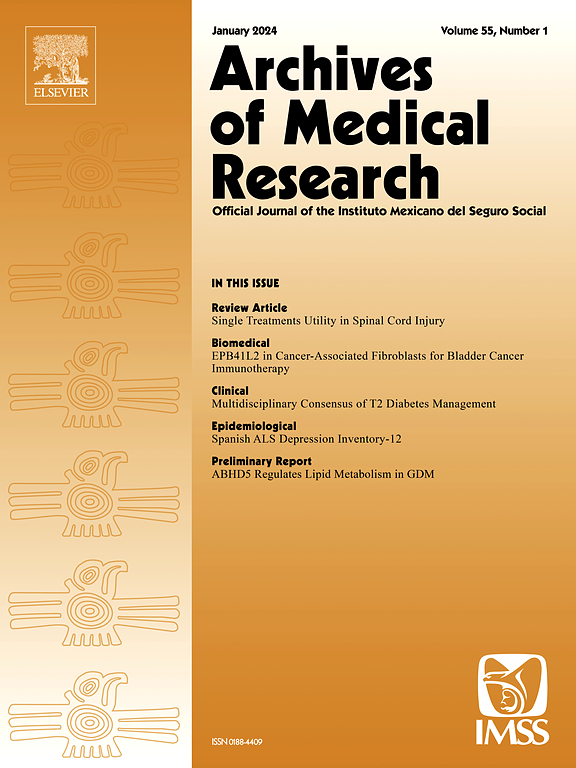Loneliness and cognitive function in older adults living in Latin America: A systematic review
IF 3.4
3区 医学
Q1 MEDICINE, RESEARCH & EXPERIMENTAL
引用次数: 0
Abstract
English language systematic reviews with samples from high-income countries have found an inverse relationship between loneliness and cognitive function. Considering that cultural and contextual resources influence the experience of loneliness and cognitive health, we conducted a systematic review analyzing quantitative studies exploring the relationship between loneliness and cognitive function in older adults in Latin America. Following PRISMA guidelines, we used five databases (PubMed, PsycInfo, Scopus, LILACS, and SciELO). Inclusion criteria were: a) quantitative research examining the relationship between loneliness and cognitive health, b) descriptions of loneliness and measures of cognitive function, c) English or Spanish language peer-reviewed articles, and d) a sample of older adults in Latin America (≥60 years). We assessed bias using the Risk of Bias Instrument for Cross-Sectional Surveys of Attitudes and Practices. Seven of the 1,887 studies (all cross-sectional) met the inclusion criteria, comprising 26,440 participants from Brazil or Mexico. Most, but not all, found a significant inverse association between loneliness and cognitive function after controlling for salient health and psychosocial factors. Measures and conceptualizations of loneliness and cognitive function, as well as theoretical explanations linking these concepts, varied. Two studies had a high risk of bias. Current evidence suggests a possible cross-sectional association between loneliness and cognitive function in older adults in these countries. Further research is needed to examine the possible bidirectional relationship using representative samples and longitudinal designs; test pathways linking dimensions of loneliness (e.g., chronicity) to cognitive function (e.g., Alzheimer's disease continuum), and explore Latin American diversity (e.g., countries, indigenous peoples, sexual minorities).
拉丁美洲老年人的孤独感和认知功能:一项系统综述
对来自高收入国家的样本进行的英语系统综述发现,孤独感与认知功能之间存在反比关系。考虑到文化和环境资源对孤独体验和认知健康的影响,我们对拉丁美洲老年人孤独感与认知功能之间关系的定量研究进行了系统回顾分析。遵循PRISMA指南,我们使用了5个数据库(PubMed, PsycInfo, Scopus, LILACS和SciELO)。纳入标准为:a)检验孤独与认知健康关系的定量研究;b)孤独描述和认知功能测量;c)英文或西班牙文同行评议文章;d)拉丁美洲老年人样本(≥60岁)。我们使用态度和实践横断面调查的偏倚风险工具评估偏倚。1,887项研究中有7项(均为横断面)符合纳入标准,包括来自巴西或墨西哥的26,440名参与者。在控制了显著的健康和社会心理因素后,大多数(但不是全部)发现孤独感和认知功能之间存在显著的负相关。孤独和认知功能的测量和概念化,以及将这些概念联系起来的理论解释各不相同。两项研究存在高偏倚风险。目前的证据表明,这些国家老年人的孤独感和认知功能之间可能存在横断面关联。需要进一步研究使用代表性样本和纵向设计来检验可能的双向关系;测试将孤独维度(如慢性)与认知功能(如阿尔茨海默病连续体)联系起来的途径,并探索拉丁美洲的多样性(如国家、土著人民、性少数群体)。
本文章由计算机程序翻译,如有差异,请以英文原文为准。
求助全文
约1分钟内获得全文
求助全文
来源期刊

Archives of Medical Research
医学-医学:研究与实验
CiteScore
12.50
自引率
0.00%
发文量
84
审稿时长
28 days
期刊介绍:
Archives of Medical Research serves as a platform for publishing original peer-reviewed medical research, aiming to bridge gaps created by medical specialization. The journal covers three main categories - biomedical, clinical, and epidemiological contributions, along with review articles and preliminary communications. With an international scope, it presents the study of diseases from diverse perspectives, offering the medical community original investigations ranging from molecular biology to clinical epidemiology in a single publication.
 求助内容:
求助内容: 应助结果提醒方式:
应助结果提醒方式:


